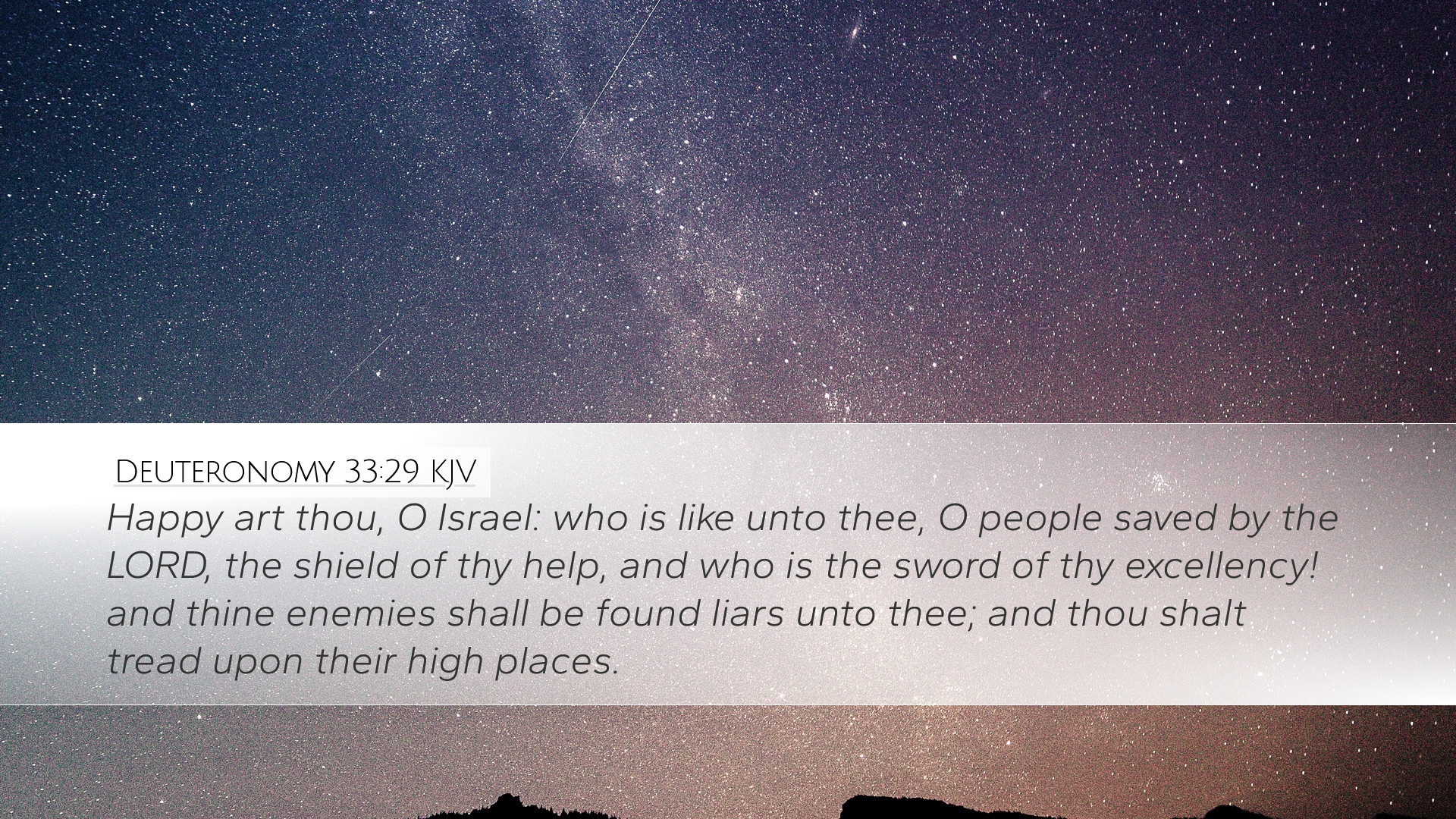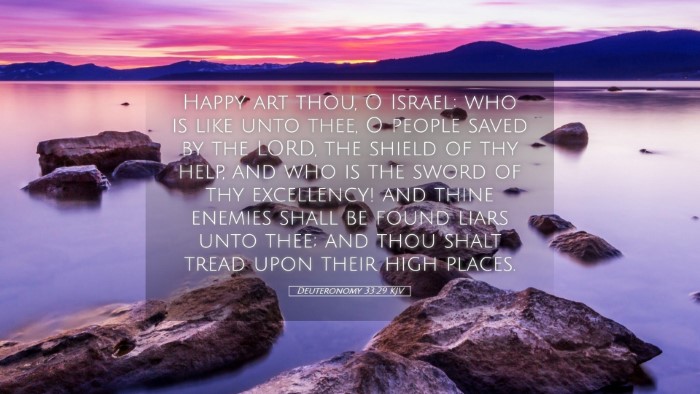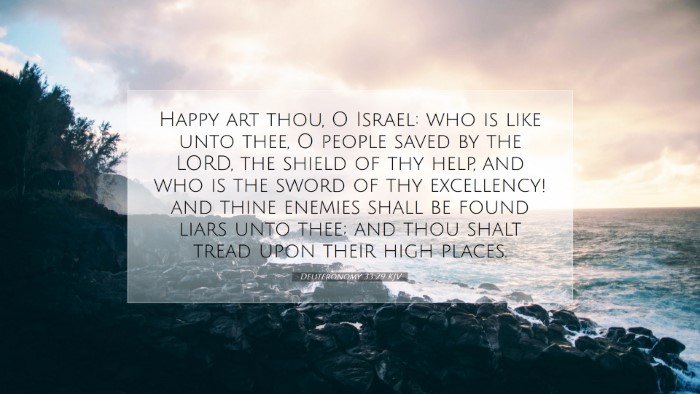Commentary on Deuteronomy 33:29
Verse Text: "Happy art thou, O Israel: who is like unto thee, O people saved by the LORD, the shield of thy help, and who is the sword of thy excellency! And thine enemies shall be found liars unto thee; and thou shalt tread upon their high places."
Introduction
Deuteronomy 33:29 serves as a majestic conclusion to the blessings pronounced by Moses upon the tribes of Israel. This verse encapsulates the essence of Israel’s identity as God’s chosen people and highlights their unique relationship with the Almighty. The rich layers of meaning embedded in this verse have been explored by various commentators throughout history, providing insight into its theological significance.
The Meaning of Happiness
Matthew Henry emphasizes the profound sense of joy encapsulated in the term "happy." He notes that true happiness for Israel stems from their unique status as the people of God. This happiness is not merely circumstantial but is deeply rooted in the spiritual blessings and protection that the Lord bestows upon His people.
Albert Barnes reiterates this theme by stating that Israel’s happiness is contrasted with other nations. They have not only the benefit of physical land and riches but also possess the presence of God among them, which is their greatest treasure.
The Distinctiveness of Israel
Both Matthew Henry and Adam Clarke draw attention to the rhetorical question, "who is like unto thee?" This phrase underscores Israel's uniqueness when compared to other nations. Henry points out that the covenant relationship they share with God sets them apart. He remarks on the improbability of any other nation experiencing what Israel has through divine revelation and intervention.
Clarke adds that the phrase calls to mind God’s mighty acts throughout their history, including the deliverance from Egypt and the giving of the Law. Such actions should lead God's people to recognize their unparalleled position in the world; they are treasured and beloved by the Lord.
Divine Protection and Warfare
The second part of the verse refers to God as the "shield" and "sword" of Israel. Henry interprets this as a depiction of God’s protective and aggressive stance on behalf of His people. The "shield of thy help" denotes that God defends and guards His people, reflecting the idea of divine refuge. In times of conflict, His people can rely on Him to fend off adversaries.
Barnes expands this idea, suggesting that the shield represents all of God’s provisions for their safety and success. The metaphor of God as a "sword" signifies the authority and strength with which He empowers Israel to overcome their enemies, affirming that God fights for them, often rendering adversaries powerless.
The Outcome of Divine Assurance
The concluding phrases of the verse project a strong message of victory: "And thine enemies shall be found liars unto thee; and thou shalt tread upon their high places." Adam Clarke explains that this indicates the ultimate futility of their enemies' efforts and schemes against Israel. Their claims will be proven false, and God’s faithfulness will culminate in Israel's triumph over their foes.
This notion of "treading upon their high places" implies a literal and metaphorical dominance. Henry asserts that the high places are symbolic of the strongholds and defenses of the enemies that will be reduced to nothing in the face of God’s power. The victorious march of Israel is a testament to God’s intervention in their lives.
Theological Reflections
This verse evokes significant theological reflections regarding the nature of God’s relationship with His people. Clarke observes that it serves as a reminder of the responsibilities that come with such divine favor. Israel’s unique calling is not merely a point of pride but also implies a commitment to live according to the covenant, adhering to God’s commandments and statutes.
The celebratory tone of the verse highlights the joy that comes from being in right relationship with God and reinforces the theme of divine providence. This commentary helps contemporary readers to appreciate their own status before God, emphasizing that believers today, as part of the Church, have a similar assurance through Christ.
Practical Applications
-
Recognition of Divine Sovereignty: Believers are called to acknowledge the sovereignty of God in their lives and the blessings that flow from their relationship with Him.
-
Calling to Witness: The unique standing of God’s people calls for a life of witness and proclamation of His greatness to the world.
-
Empowerment in Spiritual Warfare: Understanding God as both shield and sword encourages believers to engage in spiritual warfare with confidence, knowing that God fights on their behalf.
-
Living in Joy: Emphasizing the joy of being chosen by God should inspire gratitude and lead to a lifestyle characterized by worship and praise.
Conclusion
The insights gleaned from public domain commentaries on Deuteronomy 33:29 provide a rich tapestry of understanding that speaks to the heart of both pastoral and scholarly pursuits. As contemporary believers reflect on this verse, they are invited to embrace the profound truths regarding their identity, divine protection, and the assurance of ultimate victory that resonates through ages, echoing the promises of God for His unique people.


